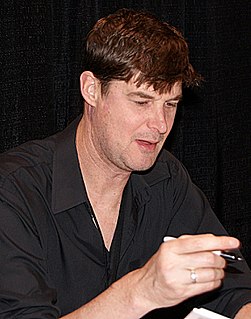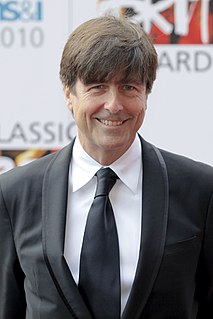A Quote by Jeff Vandermeer
If the reader enters a kind of immersive experience reading a book, then I have to enter a kind of immersive state to do my best work.
Related Quotes
Some people have argued that listening to a work of literature does not really promote literacy in the same way that reading does. Having tried this for several months, however, I can report from the trenches that, for me, immersive listening is as intellectually challenging, stimulating, and rewarding as immersive reading.
Now I began to understand art as a kind of black box the reader enters. He enters in one state of mind and exits in another. The writer gets no points just because what's inside the box bears some linear resemblance to "real life" -- he can put whatever he wants in there. What's important is that something undeniable and nontrivial happens to the reader between entry and exit.
Every reader, as he reads, is actually the reader of himself. The writer's work is only a kind of optical instrument he provides the reader so he can discern what he might never have seen in himself without this book. The reader's recognition in himself of what the book says is the proof of the book's truth.
I think "Avatar" is kind of a unique category where people are enjoying the unique theatrical experience even though they may have seen it on the small screen. They want to have that immersive, transportive experience. "2001: A Space Odyssey" played for three years at the Loews cinema in Toronto. I remember that. It just kept playing. People wanted to return to that experience. That may not be the best example because I think "2001" took 25 years to break even.
Motion pictures are just beginning to live up to their true potential of being immersive experience - going from beyond black and white flickering images to fully immersive 3D color high-definition. You don't even know where the real world starts and the fake world begins. And yet, none of that's going to matter unless the story and the emotions that they allow us to become invested in are something that we can recognize. Pixar is able to do this in ways that almost defies speculation.
That underscored this idea that when we're reading a book or writing a book, you're in an act of co-creation. The reader and the writer are both trying to dress up and present their best selves and then there's that moment, when suddenly, as a reader, you're not exactly you anymore, and likewise, as a writer, you're not really you.
You have to seduce the reader, manipulate their mind and heart, listen to the music of language. I sometimes think of prose as music, in terms of its rhythms and dynamics, the way you compress and expand the attention of a reader over a sentence, the way the tempo pushes you towards an image or sensation. We want an intense experience, so that we can forget ourselves when we enter the world of the book. When you are reading, the physical object of the book should disappear from your hands.
If you think about Cisco's offerings like TelePresence, where it's an immersive way to communicate for businesses to connect and have conversations in a real-time immersive mode, how that will change health care, how that'll change retail business, how that'll change actually travel. There's lots of changes that we will see going forward.
A writer writes a book. People read it. You don't know what they're reading, really. You read a review and think, "That is so inaccurate. You can't have been reading my book with any kind of attention, because that is all wrong, that's even the wrong name you're including there." But these reviewers have been diminished in importance, the work is so little respected. If you're reviewed by a real critic, by James Wood or Louis Menand, then you get something that is informed, interesting, and highly articulate. But the average review doesn't have that kind of depth anymore.
I know "accessibility" is a term that's kind of thrown around wantonly today, especially with talking about visual media. But I think that the strength of comics [is how they] really allow you to transcend those last barriers between a reader absorbing the information of an experience, and a reader being able to project themselves into the [experience of the] people about whom they're reading.





































